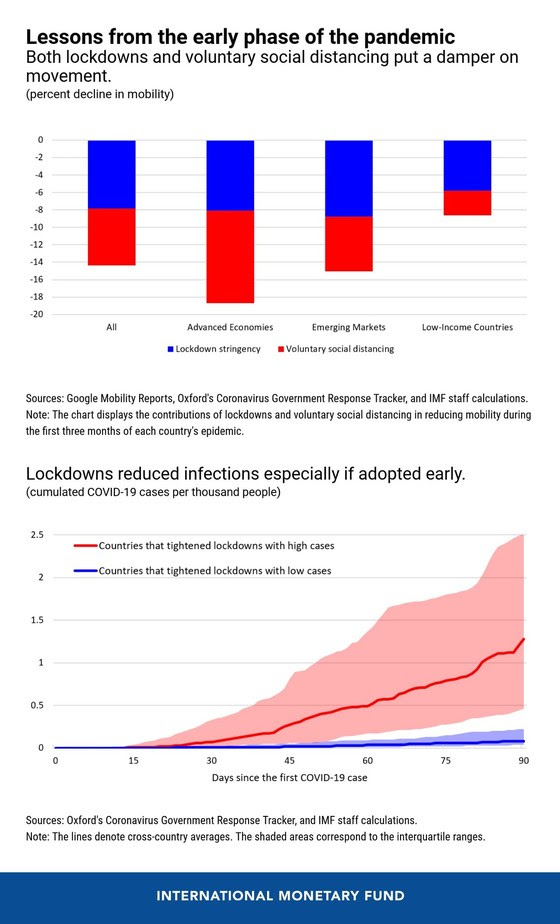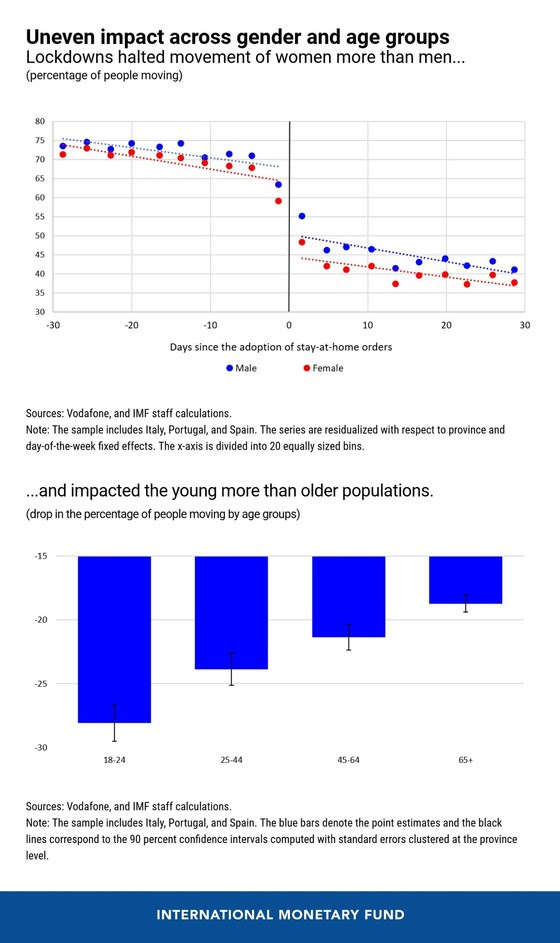One enduring lesson from the COVID-19 pandemic is that any lasting economic recovery will depend on resolving the health crisis.
Our research in the latest World Economic Outlook shows that government lockdowns—while succeeding in their intended goal of lowering infections—contributed considerably to the recession and had disproportional effects on vulnerable groups, such as women and young people.
But the recession was also largely driven by people voluntarily refraining from social interactions as they feared contracting the virus. Therefore, lifting lockdowns is unlikely to lead to a decisive and sustained economic boost if infections are still elevated, as voluntary social distancing will likely persist.
Yet the analysis finds that a balance can be achieved in protecting public health while preventing a protracted economic decline. Lockdowns impose short-term costs but may lead to a faster economic recovery as they lower infections and thus the extent of voluntary social distancing.
Examining the medium-term effects of lockdowns as well as the robustness of our findings is an important area for future research as the pandemic evolves and more data become available.
The economic and health crisis through the lens of real-time data
We analyze the economic effects of lockdowns and voluntary social distancing using two high-frequency proxies for economic activity: mobility data from Google and job openings posted on the website Indeed.
As illustrated in the top chart below, over the entire sample of 128 countries used in the analysis, lockdowns and voluntary social distancing contributed equally to the drop in mobility during the first 3 months of a country’s epidemic. The contribution of voluntary social distancing was larger in advanced economies where people can work from home more easily or can even afford to stop working thanks to personal savings and social security benefits.
Conversely, people in low-income countries are often unable to opt for voluntary social distancing as they do not have the financial means to cope with a temporary income loss.
The analysis of job posting data provides similar insights, showing that both lockdowns and voluntary social distancing contributed substantially to the drop in labor demand.
The large contribution of voluntary social distancing in reducing mobility and job postings should warn policymakers against lifting lockdowns when infections are still elevated in the hope of jumpstarting economic activity. Addressing the health risks appears to be a pre-condition to allow for a strong and sustained economic recovery.
In this regard, the analysis reveals that lockdowns can substantially reduce infections. The effects are particularly strong if lockdowns are adopted early in a country’s epidemic.
The bottom chart below shows that countries that adopted lockdowns when COVID-19 cases were still low experienced much better epidemiological outcomes relative to countries that intervened when cases were already high.
The chapter also documents that lockdowns must be sufficiently strict to curb infections, thus suggesting that stringent and short-lived lockdowns could be preferable to mild and prolonged measures.

The effectiveness of lockdowns in reducing infections, coupled with the finding that infections can considerably harm economic activity because of voluntary social distancing, calls for re-considering the prevailing narrative about lockdowns involving a trade-off between saving lives and supporting the economy.
This characterization of lives vs. livelihoods neglects that effective lockdown measures taken early during an epidemic may lead to a faster economic recovery by containing the virus and reducing voluntary social distancing.
These medium-term gains may offset the short-term costs of lockdowns, possibly even leading to positive overall effects on the economy. More research is warranted on this important aspect as the crisis evolves and more data become available.
The impact of lockdowns on vulnerable groups
The chapter also contributes to the growing evidence that the crisis is having disproportionate effects on more vulnerable groups. Mobility data provided by telecommunications company Vodafone for Italy, Portugal, and Spain, show that stay-at-home orders and the associated school closures led to a larger drop in the mobility of women relative to men.
This effect is largely due to the disproportionate burden that women face in caring for children, which may prevent them from going to work, thus jeopardizing their employment opportunities.
The Vodafone data also reveal that lockdowns tend to impact the mobility of younger people more strongly. The bottom chart below shows that stay-at-home orders led to a sharper decline in the mobility of people aged 18 to 24 and 25 to 44 who tend to have younger children to care for when schools are closed and often have temporary job contracts that are more likely to be terminated during a crisis.
The larger impact on these populations threatens to increase inter-generational inequality.

Targeted policy intervention—such as strengthening unemployment benefits and supporting paid leave for parents—is thus needed to protect more vulnerable people and ensure that the crisis does not lead to a long-lasting widening of inequality.








